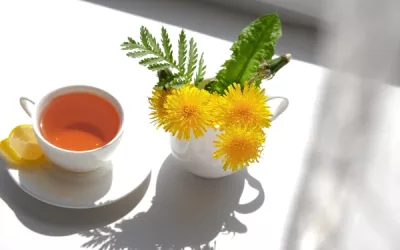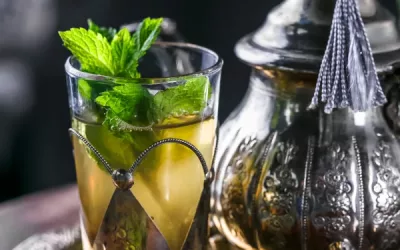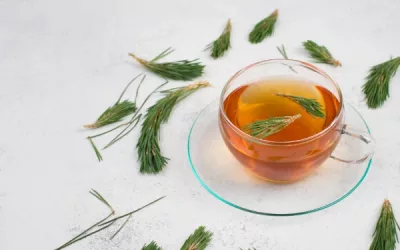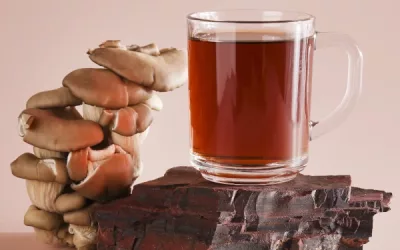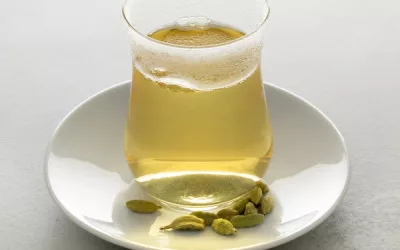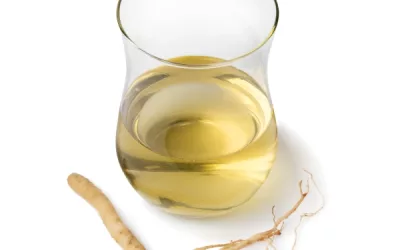Have you ever wondered how a humble plant can become a powerhouse for respiratory health? Mullein tea, steeped in tradition and natural remedies, offers a soothing solution for those grappling with respiratory issues. This article dives into the remarkable benefits of mullein tea, practical preparation methods, and essential safety tips. Whether you’re seeking relief or simply curious about herbal alternatives, understanding mullein tea’s rich history and health advantages will empower you to make informed choices for your well-being. Let’s explore this herbal gem together!
Table of Content
What is Mullein tea?
Mullein tea is a herbal tea made from the leaves and flowers of the mullein plant, scientifically known as Verbascum thapsus. Mullein is a tall, biennial plant native to Europe, North Africa, and Asia, but it has also been naturalized in other parts of the world, including North America. The plant is recognizable by its tall stalk, which can grow up to six feet tall, and its large, soft, woolly leaves. It produces yellow flowers in the second year of growth.
Mullein tea is generally considered safe when consumed in moderate amounts and is appreciated for its potential health benefits, particularly for respiratory health.
What should you look for when selecting a quality mullein tea?
Quality over quantity should be your mantra here. Look for these hallmarks when hunting for mullein tea:
- Organic certification: Ensures no nasty chemicals or pesticides.
- Non-GMO labels: No franken-tea for you!
- Transparent sourcing: Knowing where your tea comes from is always a good sign.
- Positive reviews: Learn from others’ experiences.
- Freshness dates: Check those expiration dates so you’re not sipping on stale leaves.
A tea that ticks all these boxes is likely to be worth your hard-earned cash.
How do you prepare mullein tea effectively?
Preparing mullein tea effectively involves using the right ingredients and following a precise method to extract its beneficial properties. Mullein tea, made from the leaves and flowers of the mullein plant, has been used for centuries for its potential health benefits, especially in respiratory health. Below, you’ll find a detailed table to help you prepare mullein tea, including preparation steps, recommended quantities, and tips for enhancing the flavour.
The table is structured to be easy to follow: the first column lists the preparation steps, the second column specifies the recommended quantities of each ingredient, and the third column offers some tips to enhance the flavour of your tea. This will ensure you get the most out of every cup.
| Preparation Steps | Recommended Quantities | Flavour Enhancement Tips |
|---|---|---|
| 1. Gather Ingredients | 1-2 teaspoons dried mullein leaves or flowers | Add a pinch of dried mint for a fresh taste |
| 2. Boil Water | 1 cup (240 ml) | Use filtered water for a cleaner taste |
| 3. Steep Mullein | Pour boiling water over mullein | Cover the cup to retain heat and aroma |
| 4. Steep Duration | Steep for 10-15 minutes | For a stronger taste, steep longer but not over 20 minutes |
| 5. Strain the Tea | Use a fine mesh strainer | Add a slice of lemon for a citrusy kick |
| 6. Sweeten (Optional) | Honey or natural sweeteners | Honey not only sweetens but can also soothe the throat |
| 7. Serve and Enjoy | As desired | Serve hot or chilled with ice for a refreshing drink |
Using this table will guide you through the process of making a perfect cup of mullein tea. Be mindful of the recommended quantities and flavour enhancement tips to tailor the tea to your liking.
What are the benefits of drinking mullein tea?
Mullein tea has been lauded for its numerous health benefits, particularly for respiratory issues. Here are some of the main advantages:
- Supports respiratory health by soothing the throat and reducing inflammation
- Acts as an expectorant, helping to clear mucus from the lungs
- Provides relief from coughs and colds
- Contains antioxidants which may help to protect cells from damage
- May have antiviral and antibacterial properties
- Anti-inflammatory effects can help reduce swelling in the respiratory tract
- Promotes relaxation and reduces stress
Drinking mullein tea can be a natural way to support your respiratory health, especially during cold seasons.
Are there any side effects of mullein tea?
While mullein tea is generally considered safe, it’s important to be aware of potential side effects:
- Allergic reactions in some individuals, particularly those allergic to plants in the same family (such as ragweed)
- Fine hairs on the leaves and flowers can irritate the throat if not properly filtered
- Possible interactions with certain medications; consult your doctor if you’re on medication
- Overuse can lead to mild digestive upset
It’s always a good idea to start with a small amount to see how your body reacts and consult with a healthcare provider if you have any concerns.
During the Middle Ages, mullein was a staple in herbal medicine. Monks in European monasteries cultivated mullein plants in their gardens and used them to treat ailments like respiratory infections and skin conditions.
They recognised the herb’s healing properties long before modern science confirmed its benefits. These ancient herbalists relied on their knowledge of plants to cure illnesses, passing down their wisdom through generations.
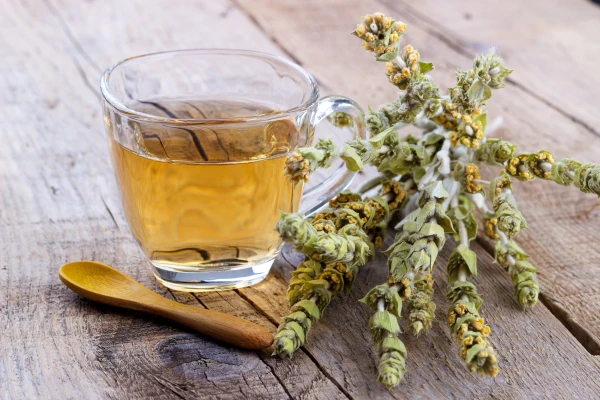
What are the potential side effects of mullein tea?
So, you’ve heard about mullein tea and are wondering if it’s all it’s cracked up to be? Oh, it’s got some impressive benefits. But, like any good superhero, it also has its kryptonite. Let’s break it down.
Mullein tea is often hailed for its potential to ease respiratory issues, thanks to its anti-inflammatory and expectorant properties. However, not everyone should be gulping it down like it’s going out of style. For starters, skin irritation can happen if you’re sensitive to the plant’s fuzziness.
Imagine getting an unwelcome rash instead of that zen feeling! Pregnant or breastfeeding? You might want to hold off, as there’s limited research on its safety in this group.
Mixing mullein tea with your medications could lead to unwanted interactions, so talk to your doc before making it a staple. And allergies—always keep an eye out for those. You don’t want your quest for health landing you in discomfort. General safety guidelines? Common sense goes a long way. Start with small amounts and see how your body reacts.
What precautions should pregnant or breastfeeding women take?
Wondering if you should swap your regular cuppa for some mullein tea while growing a mini human? Hold that thought.
- Limited Research: Not enough studies to confirm it’s safe for pregnant or breastfeeding women.
- Potential Risks: Anything not well-researched is best avoided during pregnancy and lactation, no matter how ‘natural’ it seems.
- Talk to Your Doctor: Your healthcare provider can offer advice tailored to your unique situation.
- Alternative Remedies: If you’re looking for a safe herbal fix, consulting a herbalist could be a good shout.
- Read Labels: Some teas have added ingredients that might be a red flag during pregnancy.
It’s always better to err on the side of caution, especially when it comes to your baby’s health. Many herbal remedies are fantastic, but they’re not always mum-to-be friendly. Prioritise safe, well-researched options and keep your healthcare provider in the loop.
Are there any known interactions with common medications?
So you’re on medication and think mullein tea might be a nice addition to your health routine? Hold your horses.
- Digoxin: Used for heart conditions, this could have complications when mixed with certain herbs.
- Diuretics: Mullein tea has mild diuretic properties which could interfere with your meds.
- Anti-diabetic drugs: Watch out if you’re on these, as the tea might lower blood sugar levels.
- Anticoagulants: Blood thinners are another type you need to be wary of mixing with herbs.
- Over-the-counter meds: Always check; interactions aren’t limited to prescription drugs.
Before you start brewing that pot of mullein tea, make sure to consult your doctor. Medical professionals can give you the green light or tell you to steer clear, keeping everything in balance.
How can one identify an allergic reaction to mullein tea?
Think you’ve developed an allergic reaction to mullein tea? Let’s get to the symptoms.
- Skin Rash: Breaking out after sipping your tea? Could be a sign.
- Itchy Throat: This is a common allergic reaction and a clear warning sign.
- Shortness of Breath: If you’re gasping more than usual, that’s your cue to stop immediately.
- Swelling: Particularly around the face, lips, tongue, or throat.
- Stomach Upset: Nausea or vomiting could mean your body isn’t on board with the tea.
If you suspect an allergic reaction, stop drinking the tea and seek medical advice pronto. Allergy symptoms can range from mild to severe, and it’s always better to be safe than sorry.
Back in the day, Greek physician Dioscorides was quite the fan of mullein, recommending it for various ailments. He certainly wasn’t dealing with modern medications or pregnancy concerns, but his writings laid the foundation for herbal medicine in Western traditions. These ancient roots underscore why we should respect even natural remedies and approach them with well-informed caution.
How does mullein tea compare to other herbal teas?
Alright, buckle up! If you’ve ever found yourself lost in the herbal tea section of your local health store, you’ve probably noticed that the options are as diverse as a music festival crowd. Today, we’re putting mullein tea head-to-head with the heavyweights: chamomile, peppermint, and ginger. We’ll dive into the nitty-gritty: health benefits, taste profile, preparation, and safety. Let the tea-fight commence!
When it comes to health benefits, mullein tea, chamomile, peppermint, and ginger all bring something unique to the party. Mullein tea is your go-to for respiratory issues and chest congestion.
Those furry mullein leaves are packed with anti-inflammatory and mucilage properties, which means they can soothe that tickly cough or relieve asthma symptoms. On the other hand, chamomile is calming royalty, ideal for sleep problems and anxiety.
Peppermint tea, with its menthol magic, is the digestive system’s best friend, easing bloating and indigestion. And let’s not forget ginger tea, the fiery warrior that fights nausea and inflammation like a champ.
Taste wise, mullein tea is like a subtle, earthy garden in a cup. It’s not going to slap you in the face with an overpowering flavour, but it’s mild and pleasant. Chamomile? Imagine sipping on a floral meadow. Peppermint is like a cool breeze on a hot day – refreshing and minty.
Ginger, oh ginger, it’s warm, spicy with a touch of zing. It might just wake you up faster than your morning coffee!
Preparation methods for these teas are fairly standard but with some twists. Mullein tea involves steeping dried leaves in boiling water and then, crucially, straining it well to avoid those pesky leaf hairs.
Chamomile tea is straightforward – flowers in boiling water, steep, and sip. Peppermint? Same deal as chamomile but with leaves. Ginger tea demands a bit more effort. You can use fresh ginger root, sliced or grated, or opt for dried ginger. Boil and brew to coax out that spicy punch.
Safety-wise, these teas are generally seen as benign. However, mullein tea requires proper straining, as unfiltered mullein can irritate your throat. Chamomile, while typically gentle, can trigger allergies in folks allergic to daisies.
Peppermint tea should be avoided by people with acid reflux or GERD, as it can exacerbate symptoms. Ginger tea, fiery as it is, might cause heartburn or stomach upset in high doses. Always keep things in moderation and watch for your unique reactions.
What unique benefits does mullein tea offer compared to these teas?
Mullein tea stands out in the herbal tea crowd for its respiratory benefits. This isn’t your run-of-the-mill tea; it’s specifically cherished for its ability to:
- Relieve chest congestion by loosening mucus
- Soothe throat irritation and dry coughs
- Act as a mild sedative, promoting relaxation
- Assist with asthma and other respiratory conditions
- Offer anti-inflammatory benefits that aid in reducing respiratory inflammation
It’s like a breath of fresh air, quite literally!
How do the preparation methods differ among these herbal teas?
Preparation methods aren’t one-size-fits-all in the world of herbal teas. Here’s the breakdown:
- Mullein tea: Steep dried mullein leaves in boiling water for 10-15 minutes. Strain thoroughly to remove leaf hairs.
- Chamomile tea: Add chamomile flowers to boiling water. Steep for 5-10 minutes. Strain and enjoy.
- Peppermint tea: Use fresh or dried peppermint leaves. Steep in boiling water for 7-10 minutes. Strain and drink.
- Ginger tea: Fresh ginger (sliced or grated) or dried ginger is boiled in water for 10-15 minutes. Strain and sip.
Each technique enhances the unique flavour and health properties of the tea.
Are there any safety concerns specific to these herbal teas?
When it comes to herbal teas, it’s not all rosy. Some safety tips to keep in mind:
- Mullein tea:
- Proper straining is a must to avoid throat irritation from leaf hairs.
- Use in moderation as excessive consumption might lead to mild stomach upset.
- Chamomile tea:
- Beware if you’re allergic to daisies; it could cause sneezing or skin reactions.
- Peppermint tea:
- Not suitable for people with acid reflux or GERD; it can make symptoms worse.
- Ginger tea:
- High doses can lead to heartburn and stomach issues due to its spiciness.
Be mindful of these considerations to enjoy your tea safely.
During the American Civil War, mullein tea wasn’t just another herbal remedy; it was a game-changer. Soldiers in the battlefield, often far from any medical aid, used mullein leaves to treat respiratory problems and wounds.
This bushy plant, growing wild and free, became their trusty companion, offering relief from the relentless coughs that plagued them in the harsh conditions. The Union Army even included mullein in their medical supplies, recognising its value. So, next time you sip on your mullein tea, remember it’s been a battlefield-tested hero for centuries!
What are the historical uses of mullein tea?
You might be thinking, “What’s the big deal about mullein tea?” Well, buckle up, because mullein tea has a rich history that spans centuries and even continents. This humble herb, with its fluffy, velvety leaves and tall, yellow-flowered spikes, has been used in ancient herbal practices, been surrounded by a ton of folklore, and has served various cultures with its traditional remedies. Let’s dive into the fascinating past of this multi-purpose herb.
Mullein tea has been a go-to remedy for numerous cultures due to its supposed benefits for respiratory issues. Back in the day, our ancestors didn’t have fancy pharmacies at every corner. Instead, they had herbs like mullein. Ancient Greeks, known for their wisdom and legendary togas, used mullein to make herbal infusions, teas, and even poultices to deal with things like coughs, colds, and other respiratory complaints.
Traditionally, the leaves and flowers of the mullein plant were dried and steeped in hot water to create a soothing tea that could help clear up congestion and soothe irritation. It was essentially the ancient world’s answer to cough syrup—without that nasty artificial cherry flavour!
How has mullein tea been used in traditional medicine?
Mullein tea wasn’t just for the sniffles. It found its place in a myriad of traditional medicine practices.
- Respiratory Health: Mullein was a staple for treating asthma, bronchitis, and tuberculosis. People believed it helped clear up the gunk in their lungs.
- Anti-inflammatory Properties: The tea was used to reduce inflammation. It provided relief for those suffering from pain and swelling.
- Digestive Issues: Got a tummy ache? Past generations would brew up some mullein tea for that too, hoping to calm upset stomachs.
- Topical Applications: Crushed mullein leaves were applied to the skin for burns, rashes, or even haemorrhoids. Yes, you read that correctly.
What cultural significance does mullein hold in different societies?
You need to understand its cultural significance to truly grasp why mullein was such a big deal.
- European Traditions: In Europe, particularly in Ireland, mullein was sometimes referred to as “hag taper” and was used in rituals to ward off evil spirits. The dried stalks were even used as torches.
- American Indigenous Tribes: Several Native American tribes used mullein extensively. For them, it wasn’t just about physical health but also spiritual well-being.
- Chinese Herbal Medicine: Mullein has been a part of traditional Chinese medicine, although it goes by different names and is often used in combination with other herbs.
- Roman and Greek Use: The ancient Romans and Greeks used mullein not only for medicinal purposes but also as a dye for their textiles.
Are there any historical figures known for advocating the use of mullein?
Believe it or not, even some well-known historical figures were fans of the mullein plant.
- Dioscorides: This ancient Greek physician and pharmacologist, basically the walking Wikipedia of his time, documented mullein in his encyclopedia “De Materia Medica”. He recommended it for treating lung diseases.
- Pliny the Elder: The Roman naturalist Pliny also gave mullein a shout-out in his extensive works, advocating its use for a range of ailments.
- Hilary of Poitiers: An early Christian bishop, he considered mullein a holy herb, often using it in healing rituals.
- John Gerard: A famous 16th-century English herbalist, Gerard didn’t just grow mullein; he sang its praises in his well-known “Herball” book, documenting it as versatile and indispensable.
The story of mullein tea is as rich and complex as the tea itself. Take, for instance, King Henry VIII. Known for his tumultuous reign and his multiple wives, Henry suffered greatly from leg ulcers.
Rather than just gobbling up the court’s supply of roasted meats, he reportedly used herbal teas, including mullein, to treat his afflictions. While the efficacy of these treatments is up for debate, it shows how deeply ingrained herbal remedies were in historical health practices.
So, the next time you make yourself a cup of mullein tea, remember that you’re sipping on a brew with millennia of history behind it. Whether you’re dealing with a cold, seeking anti-inflammatory properties, or just want to ward off some evil spirits, this herb has got you covered. Cheers!
How can you enhance the flavour of mullein tea?
There’s no reason to sip on bland tea when you could be enjoying a cup of mullein tea that dances on your taste buds. You’re health-conscious, right? So let’s get those herbs, spices, and sweeteners working in your favour. Here are some easy ways to make mullein tea not just healthy, but downright delicious.
What are some popular natural sweeteners to use?
You don’t need to dump a sugar bowl into your tea to make it sweet. Mother Nature’s got an arsenal of natural sweeteners that won’t turn your mullein tea into a calorie bomb:
- Honey: A classic that pairs well with almost any tea. Rich, smooth, and loaded with a laundry list of benefits for colds and sore throats.
- Stevia: Zero-calorie, plant-based, and up to 300 times sweeter than sugar. A pinch is more than enough.
- Maple Syrup: Adds a unique, robust sweetness. Think pancakes in a cup but healthier.
- Agave Nectar: A low-glycaemic index makes this a favourite among those avoiding sugar spikes.
- Coconut Sugar: Slightly caramel-like and minimally processed, making it a great alternative to white sugar.
With these natural options, you can sweeten your mullein tea without feeling guilty. Plus, you’re getting a bonus of health benefits that go beyond just flavour.
Which herbs or spices pair well with mullein tea?
Let’s not just stop at sweeteners. Herbs and spices can transform your mullein tea into something you’d sip at a posh tearoom. Consider these pairings:
- Mint: Offers a refreshing zing that can clear up your sinuses. Perfect if you’re tackling a cold.
- Ginger: Adds a spicy kick and aids in digestion. No more boring cups for you.
- Lemon Balm: Relaxes and refreshes. Great for winding down after a long day.
- Cinnamon: Provides a warm, cosy flavour that feels like a hug in a mug.
- Clove: Slightly intense but intriguing. Perfect for when you want to feel exotic.
Spices and herbs not only boost the flavour but come with added health perks. A win-win, right?
How can presentation enhance the overall tea-drinking experience?
We eat with our eyes first, right? The same goes for drinking. By sprucing up the presentation, you can turn an ordinary tea session into an Instagram-worthy experience:
- Teapot and Teacup: Go for ceramic or glass to make it feel fancy. Trust me, it makes a difference.
- Garnishes: A slice of lemon or a sprig of mint does wonders. It’s like a little hat for your tea.
- Handcrafted Coasters: Small details matter. Choose something that feels special to you.
- Serving Tray: Present your tea on a beautiful tray, perhaps with a small vase of fresh flowers.
A well-presented cup of mullein tea is more enjoyable and makes you feel like you’re treating yourself—which you totally are.
So, you’re adding taste and flair, while also keeping your mullein tea natural and healthy. But did you know that the love for tea presentation goes way back?
In the 1800s, Anna, the Duchess of Bedford, is credited with inventing Afternoon Tea as a mini meal to stave off hunger between lunch and dinner. She made it a social event, complete with beautifully set tables and a variety of sweeteners and snacks. There’s something timeless about enjoying tea that looks and tastes good.
Now, go ahead and make your next cup of mullein tea something special.
Conclusion
As I reflect on the myriad benefits of mullein tea, it becomes increasingly clear how it serves as more than just a soothing beverage; it’s a potent herbal ally steeped in history and tradition.
From supporting respiratory health and showcasing impressive antiviral properties to its anti-inflammatory effects, the significance of mullein tea in our wellness routines cannot be overstated.
The research backing these benefits lends credibility to this ancient remedy, making it an enticing alternative for those seeking natural solutions to respiratory concerns.
The preparation of mullein tea also opens avenues to culinary creativity; it invites us to enhance our tea-drinking experience through flavour combinations that can be both enjoyable and beneficial.
Likewise, understanding its potential side effects and the precautions necessary for certain groups, such as pregnant women, highlights the importance of informed consumption. The careful choice of quality products can further enhance its health benefits, proving that not all teas are created equal.
Looking ahead, I encourage anyone curious about herbal remedies to delve deeper into the world of plants like mullein. This exploration could lead to not only a broader understanding of health alternatives but also a deeper appreciation for nature’s pharmacy.
How many other natural aids, waiting to be discovered, could potentially aid in our health journeys?
In closing, as we embrace the wisdom of ancient practices, let’s remember the words of Hippocrates: “Nature itself is the best physician.” Perhaps it’s time to pick up a cup of mullein tea and reflect on how nature can support our health in the most delightful ways.
Resources
- The Antioxidant, Anticarcinogenic and Antimicrobial Properties of Verbascum Thapsus L.
- Common mullein (Verbascum thapsus L.): recent advances in research
- Biological activity of common mullein, a medicinal plant
- Searching for Scientific Explanations for the Uses of Spanish Folk Medicine: A Review on the Case of Mullein (Verbascum, Scrophulariaceae)
- How Mullein Benefits Your Lungs
- What’s in a Name? Can Mullein Weed Beat TB Where Modern Drugs Are …
- MULLEIN – Uses, Side Effects, and More
- Mullein Benefits: Is Mullein Good for Your Lungs?
- What Is Mullein Tea Good for, and Are There Any Side Effects?


